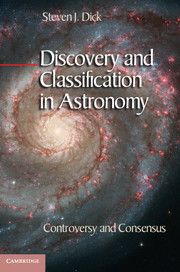Book contents
- Frontmatter
- Contents
- Preface
- Abbreviations
- Introduction The Natural History of the Heavens and the Natural History of Discovery
- Part I Entrée
- Part II Narratives of Discovery
- Part III Patterns of Discovery
- Part IV Drivers of Discovery
- Part V The Synthesis of Discovery
- 10 Luxuriant Gardens and the Master Narrative
- 11 The Meaning of Discovery
- Appendix 1 Astronomy’s Three Kingdoms
- Appendix 2 Astronomical Discoveries and Their Extended Structure
- Notes
- Select Bibliographical Essay
- Glossary of Concepts Related to Discovery
- Index
10 - Luxuriant Gardens and the Master Narrative
from Part V - The Synthesis of Discovery
Published online by Cambridge University Press: 05 August 2013
- Frontmatter
- Contents
- Preface
- Abbreviations
- Introduction The Natural History of the Heavens and the Natural History of Discovery
- Part I Entrée
- Part II Narratives of Discovery
- Part III Patterns of Discovery
- Part IV Drivers of Discovery
- Part V The Synthesis of Discovery
- 10 Luxuriant Gardens and the Master Narrative
- 11 The Meaning of Discovery
- Appendix 1 Astronomy’s Three Kingdoms
- Appendix 2 Astronomical Discoveries and Their Extended Structure
- Notes
- Select Bibliographical Essay
- Glossary of Concepts Related to Discovery
- Index
Summary
This method of viewing the heavens seems to throw them into a new kind of light. They now are seen to resemble a luxuriant garden, which contains the greatest variety of productions, in different flourishing beds; and one advantage we may at least reap from it is, that we can, as it were, extend the range of our experience to an immense duration. For, to continue the simile I have borrowed from the vegetable kingdom, is it not almost the same thing, whether we live successively to witness the germination, blooming, foliage, fecundity, fading, withering, and corruption of a plant, or whether a vast number of specimens, selected from every stage through which the plant passes in the course of its existence, be brought at once to our view?
William Herschel, 1789Nothing seems to be more important philosophically than the revelation that the evolutionary drive, which has in recent years swept over the whole field of biology, also includes in its sweep the evolution of galaxies and stars, and comets and atoms, and indeed all things material.
Harlow Shapley, 1967Throughout this volume we have witnessed many narratives of discovery, each groundbreaking in its own way. But one of the greatest achievements of the twentieth century was synthesizing these discoveries into one great master narrative, itself constituting a great discovery. That master narrative is cosmic evolution, the story of the universe from its beginning with the Big Bang 13.7 billion years ago stretching down to the present moment when evolution still continues. The discovery of cosmic evolution was foreshadowed by the luxuriant gardens of William Herschel, who recognized already in the late eighteenth century that individual celestial objects at varying stages of development allow us to “extend the range of our experience to an immense duration.”
- Type
- Chapter
- Information
- Discovery and Classification in AstronomyControversy and Consensus, pp. 315 - 328Publisher: Cambridge University PressPrint publication year: 2013



